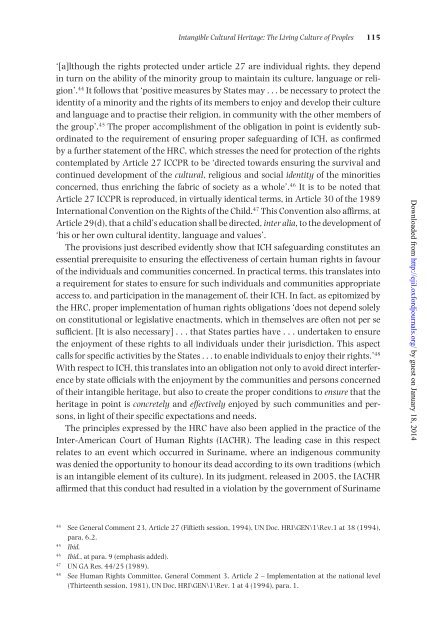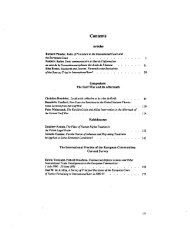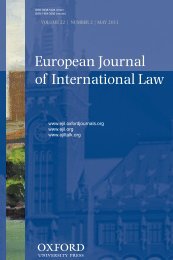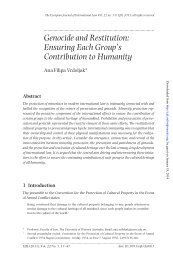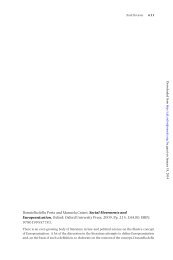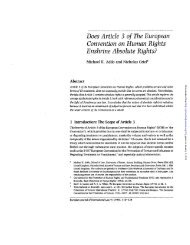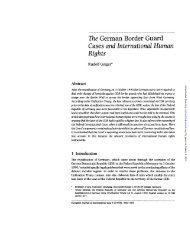Intangible Cultural Heritage - European Journal of International Law
Intangible Cultural Heritage - European Journal of International Law
Intangible Cultural Heritage - European Journal of International Law
You also want an ePaper? Increase the reach of your titles
YUMPU automatically turns print PDFs into web optimized ePapers that Google loves.
<strong>Intangible</strong> <strong>Cultural</strong> <strong>Heritage</strong>: The Living Culture <strong>of</strong> Peoples 115<br />
‘[a]lthough the rights protected under article 27 are individual rights, they depend<br />
in turn on the ability <strong>of</strong> the minority group to maintain its culture, language or religion’.<br />
44 It follows that ‘positive measures by States may . . . be necessary to protect the<br />
identity <strong>of</strong> a minority and the rights <strong>of</strong> its members to enjoy and develop their culture<br />
and language and to practise their religion, in community with the other members <strong>of</strong><br />
the group’. 45 The proper accomplishment <strong>of</strong> the obligation in point is evidently subordinated<br />
to the requirement <strong>of</strong> ensuring proper safeguarding <strong>of</strong> ICH, as confirmed<br />
by a further statement <strong>of</strong> the HRC, which stresses the need for protection <strong>of</strong> the rights<br />
contemplated by Article 27 ICCPR to be ‘directed towards ensuring the survival and<br />
continued development <strong>of</strong> the cultural, religious and social identity <strong>of</strong> the minorities<br />
concerned, thus enriching the fabric <strong>of</strong> society as a whole’. 46 It is to be noted that<br />
Article 27 ICCPR is reproduced, in virtually identical terms, in Article 30 <strong>of</strong> the 1989<br />
<strong>International</strong> Convention on the Rights <strong>of</strong> the Child. 47 This Convention also affirms, at<br />
Article 29(d), that a child’s education shall be directed, inter alia, to the development <strong>of</strong><br />
‘his or her own cultural identity, language and values’.<br />
The provisions just described evidently show that ICH safeguarding constitutes an<br />
essential prerequisite to ensuring the effectiveness <strong>of</strong> certain human rights in favour<br />
<strong>of</strong> the individuals and communities concerned. In practical terms, this translates into<br />
a requirement for states to ensure for such individuals and communities appropriate<br />
access to, and participation in the management <strong>of</strong>, their ICH. In fact, as epitomized by<br />
the HRC, proper implementation <strong>of</strong> human rights obligations ‘does not depend solely<br />
on constitutional or legislative enactments, which in themselves are <strong>of</strong>ten not per se<br />
sufficient. [It is also necessary] . . . that States parties have . . . undertaken to ensure<br />
the enjoyment <strong>of</strong> these rights to all individuals under their jurisdiction. This aspect<br />
calls for specific activities by the States . . . to enable individuals to enjoy their rights.’ 48<br />
With respect to ICH, this translates into an obligation not only to avoid direct interference<br />
by state <strong>of</strong>ficials with the enjoyment by the communities and persons concerned<br />
<strong>of</strong> their intangible heritage, but also to create the proper conditions to ensure that the<br />
heritage in point is concretely and effectively enjoyed by such communities and persons,<br />
in light <strong>of</strong> their specific expectations and needs.<br />
The principles expressed by the HRC have also been applied in the practice <strong>of</strong> the<br />
Inter-American Court <strong>of</strong> Human Rights (IACHR). The leading case in this respect<br />
relates to an event which occurred in Suriname, where an indigenous community<br />
was denied the opportunity to honour its dead according to its own traditions (which<br />
is an intangible element <strong>of</strong> its culture). In its judgment, released in 2005, the IACHR<br />
affirmed that this conduct had resulted in a violation by the government <strong>of</strong> Suriname<br />
Downloaded from http://ejil.oxfordjournals.org/ by guest on January 18, 2014<br />
44<br />
See General Comment 23, Article 27 (Fiftieth session, 1994), UN Doc. HRI\GEN\1\Rev.1 at 38 (1994),<br />
para. 6.2.<br />
45<br />
Ibid.<br />
46<br />
Ibid., at para. 9 (emphasis added).<br />
47<br />
UN GA Res. 44/25 (1989).<br />
48<br />
See Human Rights Committee, General Comment 3, Article 2 – Implementation at the national level<br />
(Thirteenth session, 1981), UN Doc. HRI\GEN\1\Rev. 1 at 4 (1994), para. 1.


